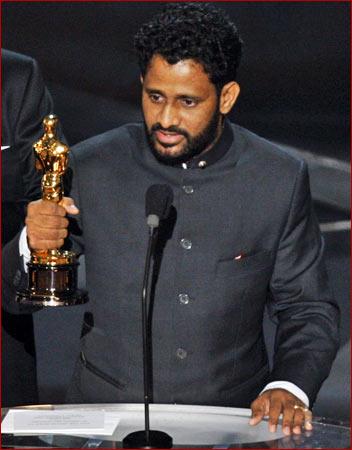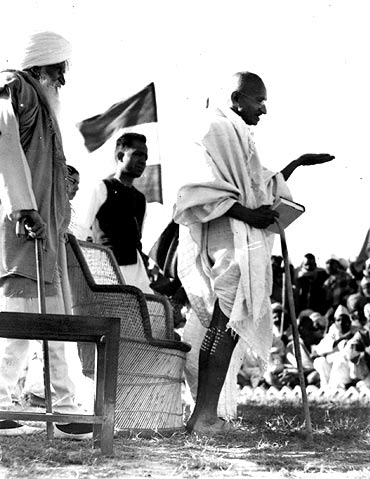 | « Back to article | Print this article |
DON'T MISS: Oscar winner's convocation speech at IIM-K
In June 12, 2005, Steve Jobs' speech at Standord University inspired many young minds. Jobs shared three stories, each of which emphasised the importance of decision making in life.
Last week, Indian sound designer and Academy award winner Resul Pookutty addressed the 2012 batch of students at IIM-Kozhikode at their convocation ceremony and made a similarly inspiring speech.
A graduate from Film and Television Institute of India, Pune, Pookutty, who belonged to a poor family, spoke to youngsters about the mistakes he made, how he overcame challenges while stressing the importance of being fearless to be successful in life. Here's a transcript of the speech for you to read:
Respected honourable minister, chairman of the august institution, parents and friends of mine who are graduating today...congratulations to all of you.
There is a world waiting outside the main gate for you.
Very soon you will know how good or bad the world is for you.
I take this opportunity as a great privilege to be able to stand here and share this stage with such distinguished academic geniuses of this country and to be able to be a part of such brilliant youngsters who are going to work out and decide the future of Indian business or for that matter economy of the country.
Thank you so much for giving me this opportunity and thank you so much Mr Director for being so kind to say that I am the brand ambassador of IIM-Kozhikode.
I take that with utmost humility. I do not know if I have the courage to bear the responsibility of such an august institution upon me.
I have prepared a speech but I am not going to read it out because I never addressed convocation (ceremony) before. And it is very difficult for me to read speeches. I think I should speak my mind today.
'You are good as long as you want to be good'
I remember going through a similar convocation (ceremony) almost a decade ago. It was a different experience.
I think it is always different when you are on the other side of the lake. Besides that, on the day of our convocation, we (students of FTII) were on protest. We took our graduation degrees from the great Dilip Saab with a placard in our hands.
We were protesting against the Film and Television Institute of India (over its decision of privatisation).
Looking back, I do not know if I was very clear about what I was doing back then.
But, many of us have done a lot things like that over an emotional outburst.
And I think it is very important that you listen to your heart first and then take your decisions. Because I believe that there is some truth in those decisions.
It may be a bad decision, but there is truth in the decision.
My success in India to the above context is my individual persuasion. I believe, you are good as long as you want to be good. That's probably why we have only one Sachin Tendulkar. Or one A R Rahman.
Illustration: Uttam Ghosh
'Mahatma Gandhi was fearless'
There are many young outstanding Indians but collectively we have some sort of enslaved thought process.
I think it is your duty today as you graduate from the institution to be able to wake up in the middle of the night, look at yourself and say, I am going to beat myself.
There have been many Indians who have been at the helm of affairs, been part of innovative technologies in different fields--cinema, art, literature.
That reminds me of the 1930s when Mahatma Gandhi went to England for the Round Table Conference.
He told the media and people from the British press that you (Britain) may have a big empire, but the artilleries and guns you use are like the patakas and phuljadhis (Indian names of crackers) our children burst in Diwali back in India.
Who would have thought that a frail looking man of his kind who wears minimal clothes and walks barefoot would challenge a mighty power and give us freedom?
There was one thing about this man--he was fearless.
If you look at how we have performed in the post independence era, you will realise that we are sort of climbing down.
When we got independence, we understood that there was a need for us to prove to the world that we are capable of something.
We identified ourselves as Indians, as people who can do things and show to the world that we can also do it.
From then on--I am not blaming anyone--the administration or the people involved--but we have kind of come down from what we were.
'We have been copycats of the West'
Let me talk about my profession.
Over the last decade and half, if I have done more than 50 films, 90 percent of my life was invested in strips of celluloid.
But I have realised that I have also missed out on several other things which I should have done, I could have done, but for some reason I could not.
When I look back, I ask myself, what was all this for?
Among the many films that I have been a significant part of, how many of them were really important?
Many of the films were forgotten, others will soon be forgotten.
Some of the names of the films I have worked on evoke laughter.
A lot of intelligent people think that the Hindi music industry is a complete tamasha. Because the songs and dances we make, the stories we say are childish, ridiculous and unimaginative, at times.
We must laugh, it is important to laugh.
But I may not be able to laugh at my own industry. That's my bread and butter.
But at the same time, I put my hand on my chest and ask: How much of the work we produced over the years has been original? I can count the results on the fingers of one hand.
Why? We have been copycats of the West.
Our mindset has been conditioned to be part of an order and a system which is designed by the West. There has been a brain drain.
We boast ourselves to be the biggest IT superpower, but we haven't created a single operating system that we can be proud of, or single software that the whole world uses.
If we have so much knowledge of IT, why can't we have another Steve Jobs?
This is a question we have to ask ourselves and also to the people who design the higher education system of our country.
As graduates who pass out of this institution, ask yourself what is that one little change that you can bring in?
What is that one little India you can create within yourself?
'My first struggle was to overcome; to identify the rest of India'
We have a problem--we are torchbearers of a biggest cultural tradition of this world.
We have a nagging history which is more than 5000 years old.
We have a tendency to live in nostalgia. We need to wake up.
We have the tendency to go back and be a recluse. That is the biggest fight that you have to do tomorrow.
I come from a very small village in Kerala away from normal civilisation.
The nearest school was 6 kilometres away. I had to walk.
Till the age of 17, there was no electricity in my village.
I am not saying this to glorify anything. I still think that 80 per cent of India lives in the dark.
My biggest struggle was when I joined Film and Television Institute of India, Pune.
I went there with the mindset of a village boy.
For the first time, I saw a Bengali, an Oriya; I saw other people, they were my brothers and sisters, but I could not talk to them. I could not understand their language.
That was my first struggle--to overcome, to identify the rest of India.
'My second struggle was to create the need for me in the industry'
Three years of my life that I spent in higher education stands aside as a rock solid island.
When I stepped out of the institution and walked into the film industry, I realised that they (the industry) did not need me.
I feel very sorry to say this.
Probably, the film industry is the only industry that requires no formal education.
In your case, if you want to work as a manager in a company, you will need an MBA.
In my case, I graduated dreaming of cinema, thinking I was going to change the life of my country with ideas that I thought I should contribute as a member of this industry.
That was my second struggle--to create the need for me in the industry.
I spent ten years of my life creating that need.
It wasn't a lone struggle--it is the struggle of an entire fraternity to arrive at a point where a decade and a half later, I can look at it and say, yes, I have managed to make a change.
This is what is waiting for you out there.
That is the real world--to be able to get by your life outside your institution you don't need your education.
It is the responsibility of each one of you to create the need for you in the society thereby make changes in the society and making our own society a vibrant collective intellect.
That's the responsibility you hold on your shoulders when you walk out
I hope you and me will create an atmosphere where you will respect labour--mental and physical.
We respect skill; we respect art; we respect inventors.
On this occasion, I pray that may each one of you succeed in your path where many of us have failed. I congratulate each one of you once again. Thank you so much!
Illustration: Dominic Xavier





